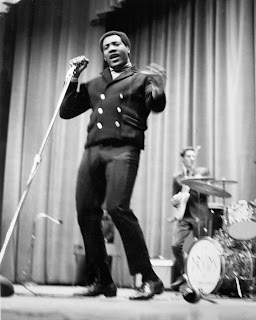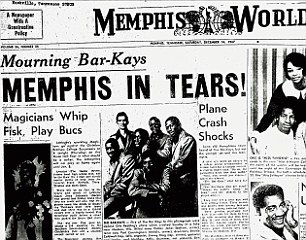Otis Redding was born in Dawson, Georgia, approximately 100 miles south of Macon, on Sept. 9, 1941. His family moved into a Macon housing project when Redding was three. He began singing in the choir of the Vineville Baptist Church. Now home to the Georgia Music Hall of Fame, Macon is arguably the vital center of soul. Little Richard, James Brown and Otis Redding – three men who shaped American blues music in from the 1950s to the 1970s and beyond — all launched their careers here. Strangely, although he consistently impacted the R&B charts beginning with the Top Ten appearance of “Mr. Pitiful” in 1965, and he is remembered for producing some of the toughest, sweetest, most enduring soul music ever created, none of Redding’s singles fared better than #21 on the pop Top Forty.
There’s one noteworthy aspect to Redding’s life not often touched upon: No one has anything unflattering to say about him. No scandals lurking in the closet, no unsavory incidents of rampant egotism to shatter his clean image, no shafting of his sidemen on long road jaunts. Just a sincerely talented soul man who enhanced the lives of everyone associated with him but died much too soon.
When he left his final recording session in Memphis, Otis Redding intended to return soon to the song he’d been working on—he still had to replace a whistled verse thrown in as a placeholder with additional lyrics that he’d yet to write. In the meantime, however, there was a television appearance to make in Cleveland, followed by a concert in Madison, Wisconsin. On its final approach to Madison on December 10 in 1967, however, the private plane carrying soul-music legend Otis Redding would crash into the frigid waters of a small lake three miles short of the runway, killing seven of the eight men aboard, including Redding. “Sittin’ On The Dock Of The Bay” would be released in its “unfinished” form several weeks later, with Redding’s whistled verse a seemingly indispensable part of the now-classic record. It would soon become history’s first posthumous #1 hit and the biggest pop hit of Redding’s career.
In the six months leading up to his death, Otis Redding had gone from one great success to another. In June, Aretha Franklin had taken a cover version of his song “Respect” all the way to #1 on the pop charts. Later that same month, the adulation of the young audience of rock fans at the Monterey International Pop Festival had transformed him into an icon of the blossoming counterculture thanks to his blistering, now-legendary live performance there. But if Otis Redding was only beginning to gain momentum within the largely white mainstream in 1967, he was already a giant in the world of soul music.
During a period in the mid-1960s when the Beatles and Motown ruled the pop charts, Otis Redding established himself as arguably the most exciting singer on the roster of Memphis-based Stax/Volt Records—itself arguably the most exciting soul and R&B label of the era. Singles like "I’ve Been Loving You Too Long” and “I Can’t Turn You Loose” (both 1965) were among Redding’s numerous top-20 hits on the R&B charts in that era, as were his soulful renditions of "(I Can’t Get No) Satisfaction” (1966) and “Try A Little Tenderness” (1967). It was the latter song, rendered in the impassioned style that was by then familiar to soul audiences, that brought down the house at Monterey just a few months before his death at the age of 26 on this day in 1967.
Soul singer Otis Redding had acquired his own plane to make touring less hectic, but the twin-engine Beechcraft H18 would prove his fatal undoing. At around 3:30 p.m. on a foggy Sunday afternoon, December 10, 1967, the plane, which encountered a storm en route from Cleveland to a concert in Madison, plunged into the frigid depths of Lake Monona. Redding, 26, and four members of his Bar-Kays band were killed. The musicians were headed to The Factory nightclub, scheduled to perform at 6:30 p.m.
The crash killed six others, everyone on board except for trumpeter Ben Cauley (bassist James Alexander had luckily avoided the flight altogether). On the cusp of achieving pop superstardom, Redding, best known for his hit, “(Sittin’ on) the Dock of the Bay,” recorded just three days earlier and released after his death, was dead. The tune was Otis’ first posthumous release and his biggest-selling single ever, topping both the R&B and pop charts on its way to going gold. Engineers tastefully overdubbed the sound effects, the mournful cries of seagulls, the singer’s lonesome whistling, after Otis’ death.
About 4,500 mourners, including a dazzling array of soul giants such as James Brown, Solomon Burke, and Wilson Pickett, crowded Macon’s City Auditorium for Redding’s funeral, a week later.
On December 3, 1997, thirty years later, hundreds of people showed up to the Monona Terrace Community and Convention Center to Georgia-born soul singer and songwriter. They’d never met the man, but they loved his music, and came to express their appreciation of the full impact of Otis Redding as a soul pioneer who inexorably altered the rhythm & blues landscape – and, ultimate, all of pop music- with his gritty, lustrous vocal, sexy, slinky lyrics and unforgettable songs.
Cauley, who hadn’t visited Madison since the crash, received a standing ovation. He told his audience how he’d awakened early that Sunday four decades ago and headed to the Cleveland airport for the trip to Madison. That day, he said, Redding told him he’d just finishing recording the supremely meditative “(Sittin’ On) The Dock of the Bay.” A few hours later, Cauley was flung out of the plane on impact. As he floated in the icy waters of Lake Monona, clinging to a cushion, he watched the rest of the plane’s passengers — including the man he once described as “…a groovy cat, like an older brother” — drowned.
When his short speech was finished, Cauley sang some of the songs that might have been on the bill at The Factory, including a trumpet-laced version of Redding’s “(Sittin’ On) The Dock of the Bay.”
There’s one noteworthy aspect to Redding’s life not often touched upon: No one has anything unflattering to say about him. No scandals lurking in the closet, no unsavory incidents of rampant egotism to shatter his clean image, no shafting of his sidemen on long road jaunts. Just a sincerely talented soul man who enhanced the lives of everyone associated with him but died much too soon.
When he left his final recording session in Memphis, Otis Redding intended to return soon to the song he’d been working on—he still had to replace a whistled verse thrown in as a placeholder with additional lyrics that he’d yet to write. In the meantime, however, there was a television appearance to make in Cleveland, followed by a concert in Madison, Wisconsin. On its final approach to Madison on December 10 in 1967, however, the private plane carrying soul-music legend Otis Redding would crash into the frigid waters of a small lake three miles short of the runway, killing seven of the eight men aboard, including Redding. “Sittin’ On The Dock Of The Bay” would be released in its “unfinished” form several weeks later, with Redding’s whistled verse a seemingly indispensable part of the now-classic record. It would soon become history’s first posthumous #1 hit and the biggest pop hit of Redding’s career.
In the six months leading up to his death, Otis Redding had gone from one great success to another. In June, Aretha Franklin had taken a cover version of his song “Respect” all the way to #1 on the pop charts. Later that same month, the adulation of the young audience of rock fans at the Monterey International Pop Festival had transformed him into an icon of the blossoming counterculture thanks to his blistering, now-legendary live performance there. But if Otis Redding was only beginning to gain momentum within the largely white mainstream in 1967, he was already a giant in the world of soul music.
During a period in the mid-1960s when the Beatles and Motown ruled the pop charts, Otis Redding established himself as arguably the most exciting singer on the roster of Memphis-based Stax/Volt Records—itself arguably the most exciting soul and R&B label of the era. Singles like "I’ve Been Loving You Too Long” and “I Can’t Turn You Loose” (both 1965) were among Redding’s numerous top-20 hits on the R&B charts in that era, as were his soulful renditions of "(I Can’t Get No) Satisfaction” (1966) and “Try A Little Tenderness” (1967). It was the latter song, rendered in the impassioned style that was by then familiar to soul audiences, that brought down the house at Monterey just a few months before his death at the age of 26 on this day in 1967.
Soul singer Otis Redding had acquired his own plane to make touring less hectic, but the twin-engine Beechcraft H18 would prove his fatal undoing. At around 3:30 p.m. on a foggy Sunday afternoon, December 10, 1967, the plane, which encountered a storm en route from Cleveland to a concert in Madison, plunged into the frigid depths of Lake Monona. Redding, 26, and four members of his Bar-Kays band were killed. The musicians were headed to The Factory nightclub, scheduled to perform at 6:30 p.m.
The crash killed six others, everyone on board except for trumpeter Ben Cauley (bassist James Alexander had luckily avoided the flight altogether). On the cusp of achieving pop superstardom, Redding, best known for his hit, “(Sittin’ on) the Dock of the Bay,” recorded just three days earlier and released after his death, was dead. The tune was Otis’ first posthumous release and his biggest-selling single ever, topping both the R&B and pop charts on its way to going gold. Engineers tastefully overdubbed the sound effects, the mournful cries of seagulls, the singer’s lonesome whistling, after Otis’ death.
About 4,500 mourners, including a dazzling array of soul giants such as James Brown, Solomon Burke, and Wilson Pickett, crowded Macon’s City Auditorium for Redding’s funeral, a week later.
On December 3, 1997, thirty years later, hundreds of people showed up to the Monona Terrace Community and Convention Center to Georgia-born soul singer and songwriter. They’d never met the man, but they loved his music, and came to express their appreciation of the full impact of Otis Redding as a soul pioneer who inexorably altered the rhythm & blues landscape – and, ultimate, all of pop music- with his gritty, lustrous vocal, sexy, slinky lyrics and unforgettable songs.
Cauley, who hadn’t visited Madison since the crash, received a standing ovation. He told his audience how he’d awakened early that Sunday four decades ago and headed to the Cleveland airport for the trip to Madison. That day, he said, Redding told him he’d just finishing recording the supremely meditative “(Sittin’ On) The Dock of the Bay.” A few hours later, Cauley was flung out of the plane on impact. As he floated in the icy waters of Lake Monona, clinging to a cushion, he watched the rest of the plane’s passengers — including the man he once described as “…a groovy cat, like an older brother” — drowned.
When his short speech was finished, Cauley sang some of the songs that might have been on the bill at The Factory, including a trumpet-laced version of Redding’s “(Sittin’ On) The Dock of the Bay.”








